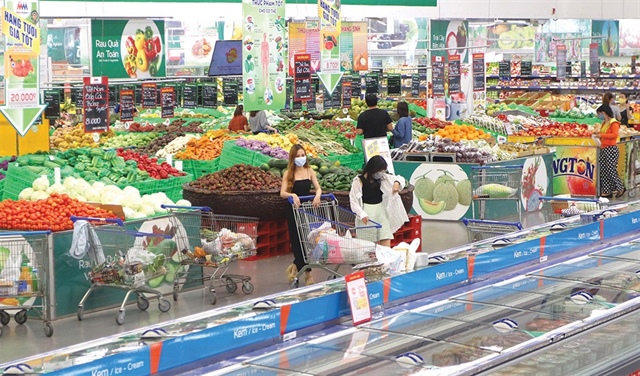Cautious Tet spending hinders FMCG
Cautious Tet spending hinders FMCG
Despite an upbeat economic outlook ahead of Lunar New Year, a shift in consumer behaviour towards simplicity and restraint is expected to dampen fast-moving consumer goods growth, signalling a more modest festive season.
According to a General Statistics Office report released on January 6, the consumer price index for the fourth quarter of 2024 rose by 2.87 per cent compared to the same period last year. The index for the year increased by 3.63 per cent over 2023, meeting the National Assembly target.

Cautious Tet spending hinders FMCG |
Retail sales and consumer services revenue for Q4 grew by 9.3 per cent compared to the previous year. For the full year, the total retail sales of goods and consumer services increased by 9 per cent, reaching approximately $255.64 million. Of this, retail goods sales amounted to $196.84 billion, representing 77 per cent and increasing by 8.3 per cent over the previous year.
Nevertheless, some statistics indicate that fast-moving consumer goods (FMCG) growth during the Lunar New Year is likely to climb at a slower pace compared to last year, as caution continues to influence purchasing decisions.
Kantar’s November report on the issue reveals a slowdown in FMCG growth between Lunar New Year in 2023 and 2024, reflecting a shift towards consumer caution.
Traditionally, the two months leading up to the festive period have seen a surge in consumer spending, but their share of the overall annual FMCG market is now declining. While the period once accounted for as much as 24 per cent of FMCG sales in rural areas, this figure dropped to just 21 per cent in 2024.
Kantar attributes this decline to a broader societal shift. “Over the past five years, Vietnamese consumers have faced a series of disruptive events: a global pandemic, inflation, and natural disasters. These challenges have sparked a desire for simplicity and introspection during the Tet season, with consumers opting for more intimate, personal gatherings and fewer extravagant purchases,” said the report.
According to Kantar, while consumer spending is expected to grow this year, the increase is likely to be slower, at around 5 per cent compared to previous years. This shift is also influenced by the trend of cutting back on alcohol and reducing social events, which may further impact demand for fast-moving consumer goods.
Le Hoang Long, senior manager at NielsenIQ Vietnam, echoed these sentiments at a seminar in November in Ho Chi Minh City. He noted that Vietnamese consumers were adopting a cautious approach to spending, particularly in light of the ongoing economic recovery.
“Major concerns include rising food prices, economic stagnation, and the financial burden of utility costs,” said Long.
Beyond financial concerns, the devastation caused by Typhoon Yagi has had a lasting impact. While production largely remained unaffected, widespread property damage has forced many consumers to allocate their budgets for repairs, limiting their spending capacity for the holiday season.
Moreover, the proximity of Tet with the Christmas period this time around has made the consumer shopping cycle more rushed. This, in turn, has reduced the overall purchasing power for Lunar New Year.
“Based on our data and real sales point observations, we predict that the FMCG market during the Lunar New Year will be relatively quiet. This reflects the delay in improving consumer sentiment, although the economy has started showing signs of recovery,” Long said.
The Consumer Shopping Behaviour report by Metric, published in November, points out that during this Lunar New Year, key product categories with strong growth potential on e-commerce platforms will include food and drink, particularly fresh produce, vegetables, confectionery, and non-alcoholic beverages. Additionally, beauty products, fashion items, and gift sets are also expected to see growth.
“Consumers are opting for more budget-conscious shopping by buying related products earlier and seeking promotions closer to the holiday,” the Metric report noted. “Health-conscious food and beverages will also be in high demand.”
Adapting to the consumer spending shift, many retailers have prioritised products that focus on convenience, practicality, and saving both time and money for consumers.
At a meeting on January 7, the Vietnam Retailers Association noted that its members had been active in preparing for the holiday season, ensuring an adequate supply of goods to meet demand.
Hanoi’s Department of Industry and Trade reported that over 1,300 retail outlets are set to be open from January 29 to February 2. Consumer goods are being subsidised and benefiting from retailer-led promotional programmes, designed to stimulate year-end spending.
“Items like cakes, candy, and fresh foods such as meat and fish are being supplied at stable prices by retail chains,” a representative from the department said. “Extensive discounts and promotions on a wide range of products are expected to ease the burden of shopping and encourage consumer spending.”
Additionally, Nguyen Trung Dung, CEO of Dh Foods, told VIR that Lunar New Year orders this year were coming in later than last year, due to economic factors impacting consumer spending. However, he remains hopeful, expecting orders to pick up as the holiday draws nearer.
In preparation, Dh Foods has boosted its raw material inventory by 20 per cent compared and secured contracts with staffing firms to hire additional workers to accelerate production as needed.
“We are closely monitoring market trends and collaborating with supermarkets on aggressive promotional campaigns, such as buy two, get one free, and buying three products to get complimentary ceramic figurines,” Dung said. “We are also diversifying our gift basket offerings, providing a range of affordable and appealing options.”























